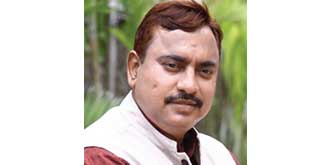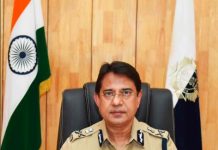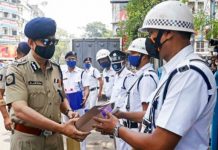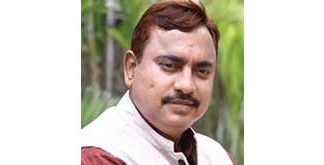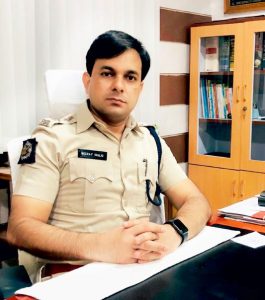 Meraj Khalid, Deputy Commissioner of Police South Division Kolkata Police opens up to Mohammad Asif regarding his responsibilities and challenges of policing and who inspired him to become a police officer. Excerpts
Meraj Khalid, Deputy Commissioner of Police South Division Kolkata Police opens up to Mohammad Asif regarding his responsibilities and challenges of policing and who inspired him to become a police officer. Excerpts
Q. Who inspired you to join the police service?
A. It was my father’s wish. My father who was a Geologist passed away when I was quite young to understand these things. But my mother always used to talk to me about my father’s wish. I grew up with this idea with emotionally attached to it, never thinking of doing anything else. My elder brother, a Biotechnologist encouraged me to join the police service. So, much before my higher education commenced, I had developed a penchant for civil service.
Q. How was your academic life?
A. After my schooling in Delhi and Ghaziabad, I did my graduation and then Masters in English literature from Allahabad University. Later, I also did LLB during my preparation for Civil Services examinations from the same university. My elder brother, who was a Biotechnologist at the National University of Singapore, had a great influence on me. He supported and inspired me to take challenges.
Q. What were the factors that influenced you most during your student’s life?
A. Actually a person has to fight several battles simultaneously in his life. Struggles do not come in a queue. You may have to encounter several problems at a time and will have to fight out each one of them simultaneously. I had my share of struggles, had to fulfill the wishes of my late father, and also to look after the family as my elder brother was abroad. Besides, there were several other problems which everyone faces. I would say each and every struggle left me with some enlightening experience, some new ideas and a better understanding of the world around. Of course, facing challenges make you stronger and confident and prepare you to set higher standards and difficult goals. It had the same effect on me.
Q. You have worked under different capacities in the police service. Please tell us something about them?
A. I joined the police service in 2007. After two years of training, I got posted as Sub-Divisional Police Officer at Khatra Sub Division of Bankura District. It was part of the Jungle Mahal area and those were the days when the Maoist insurgency was at its peak. Anti-Maoist operations were going on most of the time and I had to stay engaged in the offensive operations. It was a different kind of experience altogether. I was there for about a year. After this stint, I got promoted and posted as an Additional SP at Kharagpur in Paschim Medinipore District. Kharagpur is a metropolitan town and its proximity with state borders of Jharkhand and Odisha makes it very important. Socially and demographically Kharagpur is very different. It has a cosmopolitan nature. It’s a perfect melting pot of people of different origins and language. Initially, I was engaged in anti-Maoist operations in Paschim Medinipore but later on focused on the crime situation as the proximity of Kharagpur to inter-state borders made it vulnerable to various types of crime. After being there for one and a half years, I was promoted to the rank of SP and got posted as Commandant of ERF. After a six-month tenure, I got transferred to Siliguri as SS, CID. At that time there were no other headquarters of CID other than the one in Kolkata. It was for the first time that CID created its north Bengal HQ. I was there for a period of two and a half years. I was posted as SP, Burdwan during 2014 Lok Sabha elections. In 2015, I joined as Senior DC & DC 1st Battalion at Kolkata Police. Later on, I worked as the DC, South West division. Thereafter I got the current posting.
Q. South division has always been an important location. How do you manage your responsibility?
A. Yes. There are several important places located in this area like Eden Gardens, Victoria Memorial, Netaji Indoor Stadium, Rabindra Sadan, Kalighat Temple and many more. It provides you with ample opportunities and challenges of urban policing.
Q. These days Kolkata police are giving importance to community policing. How do you see this?
A. Community policing has become an important part of our duty these days. It helps the police connect with the people. The nature of the job is such that you can’t expect people to like you all the time. The police have to use force legitimately in the larger interest of society and as per the accepted principles to maintain law and order. For instance, we stop people from violating the law in all forms, like stopping them from crossing roads when there is no signal, prosecuting them for rash driving, enforcing regulations which they may find inconvenient. Community Policing provides an opportunity and platform for informal discourse and dialogues. Police can outreach people and convince them that they work for them. This helps in image building. Besides, community policing also helps in accumulating information from different sources, sometimes in situations when the response time is very short.
In Kolkata Police, we have many community policing programmes, ie there is “Pronam” for senior citizens, “Nabadisha” for the education of destitute children, “Sukanya” and “Tejaswini” for women empowerment etc. Bonding with the common citizen helps improve our image. Community Policing is a sort of liaisoning with the stakeholders. It has definitely helped police in bringing down the crime rate. Kolkata crime rate has come down drastically and it has emerged as one of the safest cities in the country.
Q. What is the difference between policing in rural and urban areas?
A. Rapid urbanisation and influx of people from suburbs and distant places bring culturally, socially and linguistically diverse groups together. This forms a complex layer of society. Conflict of interest among such diverse groups is bound to happen, although most of the time there may be no conflict of interest but a mere perception as people are not socially not so connected in rural societies. Urban policing is about resolving such conflicts and dealing with law and order situation arising out of such conflicts. It involves different strategies. Using the force, though legitimate, is not always the solution. Persuasion through leaders of the community, initiation of dialogue, reaching out to the people and convincing them through negotiations become the core of urban policing. Any small issue can become major if not dealt in time. Through media and social media, information gets spread with rocket speed. A quick response is very important in urban policing.
Q. How modern equipment and gadgets like PCR vans help you in quick response?
A. PCR vehicles are deployed at all strategic locations. It’s a GPS-enabled system. Their main job is to keep a watch over the area, collect, and relay information to the headquarters and intervene whenever emergencies arise. Their location is monitored through GPS which helps in diverting the nearest available PCR van to the spot where an intervention is needed.
Q. What measures you are taking to combat cybercrime?
A. There is a separate well-equipped team dedicated to deal with cybercrimes. Besides investigations, the team also runs awareness campaigns for making people aware of the types of fraud and crime which they are exposed to these days. We also advise people about the safeguards from cybercrime during the beat meetings. We hold coordination meetings with banks and with the financial institutions and ask them to take adequate measures so that frauds can be prevented. We also issue an advisory through our social media handles.
Q. Fitness has always been a priority for you. Are you setting an example to your subordinates?
A. I have always been very fond of sports. For any sports, one needs to be fit. Fitness is a state of mind. If you want to remove your stress you must have to do something. It’s not that I do something very special. Everybody has his own way. Since I am a sports- lover, I go for it. Sometimes, I play badminton, sometimes I go to gym or for running. Fitness is not just physical, one has to stay fit mentally also. I have no eating restrictions but I always eat in moderate quantity. And I try to work out it also. I love sweet like rasogollah and mishti Doi.
Q. How do you pass your leisure time?
A. I love reading books. Charles Dickens, Thomas Hardy & James Joyce have been my all-time favourite. Munshi Premchand, Dharamvir Bharti and many more are my favourite authors. I also love to read novels of writers of Indian origin. Salman Rushdie is also among my favourites. I love to listen to Ghazals particularly Mirza Ghalib. I am fond of watching movies too. During student life, I used to watch 2-4 movies every month.
Q. What will be your message for the young generation?
A. Those who wish to join police service need to prepare themselves well. They must have the natural bent of mind for taking challenges. There is a lot of scope for work and they need to know how to stick to their responsibility. And they must be responsive. Police are the most visible arm of the government. So there are appreciations for good work but also criticisms for slackness. Police has to be ready for both.

